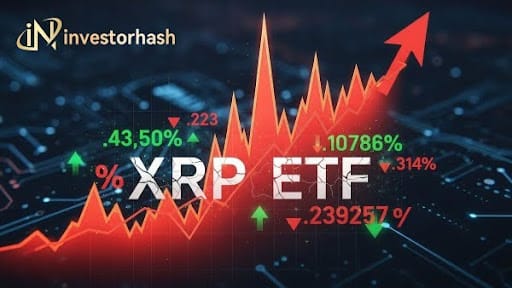European Parliament To Vote On Blockchain Infrastructure Tech Sovereignty Proposal This July

The European Parliament will vote in July on a technology sovereignty proposal backed by pro-Bitcoin lawmaker Sarah Knafo, according to Cointelegraph. The Committee on Industry, Research and Energy adopted the non-binding report on June 3, 2025, calling for European policy development in digital ecosystems. The proposal addresses Europe's position relative to the United States and China in cloud computing, cybersecurity, artificial intelligence, semiconductors and communication infrastructure. Knafo told the publication the vote will most likely occur during the July session, with right-wing parties expected to support the text.
European Digital Infrastructure Push Gains Momentum
The ITRE committee's proposal recommends lifting barriers to private investment in innovation while promoting energy-efficient computing and blockchain infrastructure. The report safeguards privacy in digital finance as European policymakers seek alternatives to foreign technology dependencies. The European Parliament comprises 720 lawmakers who will decide whether to advance the technology independence framework.
Knafo emphasized the report remains non-binding and serves to define political guidelines rather than create legally binding legislation. The proposal comes as European tech industry coalitions call for radical action on digital sovereignty, with nearly 100 organizations proposing sovereign infrastructure fund creation to reduce dependence on US corporations.
The European Commission allocated €1.3 billion through the Digital Europe Programme for 2025-2027 to deploy critical technologies for Europe's tech sovereignty. This funding supports implementation of the Chips Act, Artificial Intelligence Act and Cyber Solidarity Act across member states.
Bitcoin Advocacy Meets Digital Euro Opposition
Knafo's technology sovereignty advocacy follows her vocal opposition to the European Central Bank's digital euro plans. In December 2024, she addressed the European Parliament stating "No to the digital euro, yes to a strategic Bitcoin reserve." Her position contrasts with ECB officials who view the digital euro as necessary to counteract rising US dollar stablecoin adoption in Europe.
ECB board member Piero Cipollone recently stated that euro zone banks need a digital euro to respond to US President Donald Trump's push to promote stablecoins globally. The ECB hopes to have political decisions in place by early 2026 to issue a digital euro, requiring two to three years for actual launch.
Current European cryptocurrency regulations reflect this tension between innovation and control. MiCA regulation entered full effect on December 30, 2024, establishing uniform EU-wide regulatory rules for crypto-asset issuance and trading. The framework includes licensing requirements for crypto-asset service providers and consumer protection measures.
Market Response and Broader Economic Context
European crypto market valuations reached $6.9 billion in 2024, with projections indicating growth to $27.6 billion by 2033 according to industry analysts. This represents a 14.94% compound annual growth rate as European jurisdictions position themselves as destinations for blockchain businesses.
Research from the Atlantic Council indicates USD-based stablecoins constitute 90% of market capitalization and over 70% of trading volume in Europe, highlighting European dependence on US financial infrastructure. This data supports arguments for European digital payment alternatives.
Industry observers note mixed reactions to the sovereignty proposal. Skeptics in French media portal Frontières doubt whether the proposal will gain majority support among parliament's 720 lawmakers. One commenter suggested change would come from individual nations including Germany, Poland, Hungary and the Netherlands rather than centralized European initiatives.
Implications for Financial Independence and Global Competition
The July vote represents Europe's broader effort to achieve digital autonomy amid increasing US-China technological competition. The World Economic Forum notes that different approaches to digital governance have increased geopolitical competition, with countries pursuing varying strategies around regulation and innovation funding.
European tech sovereignty initiatives include the EuroStack project, designed to create homegrown cloud infrastructure alternatives to AWS and Azure. By 2025, EuroStack expanded into AI regulation, blockchain identity verification and cross-border data-sharing frameworks.
The proposal faces implementation challenges despite political support. European business priorities show 72% of companies prioritize data sovereignty when choosing technology vendors, up from 58% in 2022 according to European Parliament surveys. However, structural fragmentation described in recent competitiveness reports continues limiting European technology advancement.
Success depends on balancing regulation with competitiveness needs. European Commission Executive Vice-President Henna Virkkunen, responsible for tech sovereignty, security and democracy, must address regulatory complexity while spurring innovation. The July parliamentary vote will determine whether Europe advances toward genuine technological independence or maintains dependence on foreign digital infrastructure.
Related Reading on BTC Peers
BTC Peers Global Bitcoin Policy Index provides comprehensive analysis of Bitcoin adoption policies across countries and jurisdictions. This resource offers data-driven insights into how different nations approach Bitcoin regulation, from acceptance to restriction measures. Readers will gain understanding of global Bitcoin policy trends, comparative regulatory frameworks, and emerging patterns in cryptocurrency governance that complement the European Parliament's technology sovereignty discussions.




